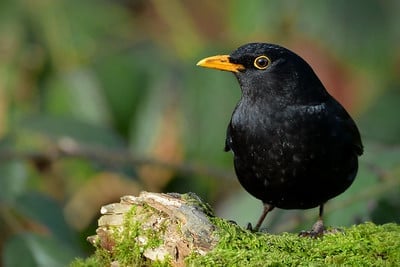A new threat to Britain’s beloved blackbirds has emerged as the Usutu virus spreads across southern England. First detected in the UK during the summer of 2020, this mosquito-carried disease has already been linked to a significant drop in blackbird numbers in some areas.
The impact is particularly stark in Greater London, where blackbird populations have fallen by 40% since the virus was first found. Dr. Arran Folly from the Animal and Plant Health Agency (APHA) notes the virus’s unexpected persistence and spread, which now reaches from Dorset to Cambridgeshire.
“We’ve seen that the virus has spread further than we thought it might do, and it’s persisted,” says Dr. Folly. This rapid expansion has caught scientists’ attention, especially as climate changes create more favorable conditions for mosquitoes in the UK.
The common house mosquito, Culex pipiens, carries the virus between birds. Longer summers and warmer temperatures are helping these mosquitoes thrive in places they couldn’t before. Heavy rainfall adds to the problem by creating more breeding spots for mosquitoes.
While the virus poses a serious threat to blackbirds, the news isn’t all dire. The birds remain common across the UK, with stable populations in many areas, particularly in rural and northern regions. Unlike in other parts of Europe, Britain hasn’t seen mass deaths of blackbirds from the virus.
Similar Posts
Scientists are now working to understand exactly how the virus affects UK bird populations. The British Trust for Ornithology (BTO) has launched a special counting project called “Blackbirds in Gardens” to track bird numbers across the country. This data will help reveal the true impact of the virus on these familiar garden visitors.
Dr Hugh Hanmer, Senior Research Ecologist at BTO, points out that while blackbird numbers were already slightly decreasing in Greater London, the decline sped up noticeably from 2020 when the virus arrived.
For those wondering about human risk, health officials say it’s low. While the virus can occasionally infect humans and horses, no human cases have been reported in the UK. However, its arrival marks the first time a mosquito-spread viral disease that can pass between animals and humans has been found in Britain.
The virus’s story began far from UK shores. Named after the Usutu River in southern Africa, where it was first found in 1959, it spent decades spreading through Africa before reaching Europe about 30 years ago. The UK’s first case in 2020 came after that year’s summer heatwave.
Infected birds may show signs of lethargy, loss of coordination, and seizures, with some cases resulting in sudden death. Scientists continue to monitor these cases through the Vector-Borne RADAR initiative, a collaboration between APHA, the UK Health Security Agency, and the Zoological Society of London.
The APHA, working with these partner organizations, keeps track of the virus’s spread. This monitoring helps understand both current impacts and possible future risks as our climate continues to change.



















